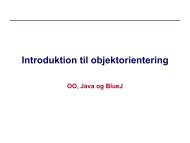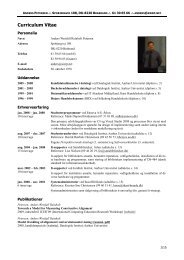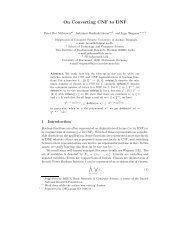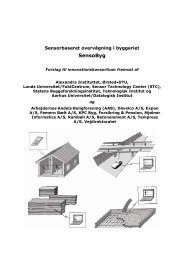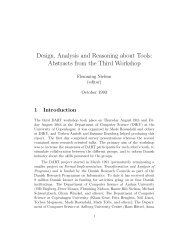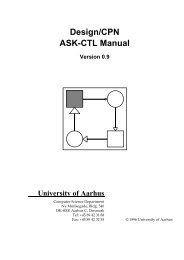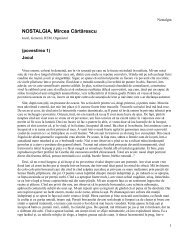towards a provotyping approach in systems development
towards a provotyping approach in systems development
towards a provotyping approach in systems development
Create successful ePaper yourself
Turn your PDF publications into a flip-book with our unique Google optimized e-Paper software.
• As a provocateur, the system developer <strong>in</strong>vestigates the present and<br />
past <strong>in</strong> order to help the practitioners experience what is wrong with<br />
the present before mak<strong>in</strong>g decisions about the future. The provocateur<br />
urges or <strong>in</strong>vites realization—both <strong>in</strong> the sense of becom<strong>in</strong>g aware of<br />
and <strong>in</strong> the sense of mak<strong>in</strong>g real—of current problems <strong>in</strong> order to decide<br />
what is needed <strong>in</strong> the future. This role is the ideal type <strong>in</strong> provocation<br />
through concrete experience. In this respect, the provocateur can be<br />
said to stand beh<strong>in</strong>d the practitioners supply<strong>in</strong>g the means to f<strong>in</strong>d out<br />
about the present <strong>in</strong> order to know what to look for and what to avoid<br />
<strong>in</strong> a future.<br />
Which role to choose depends on the concrete situation. Us<strong>in</strong>g the ideal<br />
types, one can explore which ideal roles to choose <strong>in</strong> what ideal situations. If<br />
the situation is one <strong>in</strong> which it is possible ‘objectively’ to decide beforehand<br />
what might characterize a satisfactory solution (speed up the word process<strong>in</strong>g;<br />
create statistics over the number of books registered <strong>in</strong> our system; transform<br />
files <strong>in</strong> this format <strong>in</strong>to files of that format; etc.), the most suitable role<br />
is most likely the one of an expert—assum<strong>in</strong>g the necessary competence is<br />
present. If the situation is one <strong>in</strong> which we cannot f<strong>in</strong>d such ‘objective’ criteria,<br />
when the question <strong>in</strong>volves usefulness, hand<strong>in</strong>ess, ‘contributory-ness,’ fitness<br />
etc., the most suitable role is likely to be facilitator or provocateur. The<br />
choice depends on the extent to which the problems are known beforehand.<br />
When the situation is one of problem elaboration or problem ‘def<strong>in</strong>ition’—we<br />
know that someth<strong>in</strong>g is wrong, but not what or why—the <strong>approach</strong> taken,<br />
as I have argued above, should be provocation through concrete experience,<br />
with the system developer as a provocateur. When the problems are (more<br />
or less) known, and the <strong>approach</strong> taken is directed <strong>towards</strong> possible solutions,<br />
the suitable role is likely to be facilitator.<br />
Furthermore, the idea of provocation yields a new perspective on the<br />
degree to which the <strong>systems</strong> developer needs knowledge about the field he/she<br />
<strong>in</strong>vestigates; one ‘half’ of the issue of mutual understand<strong>in</strong>g. Lack of mutual<br />
understand<strong>in</strong>g between practitioners and <strong>systems</strong> developers is most often<br />
seen as a h<strong>in</strong>drance to jo<strong>in</strong>t <strong>systems</strong> <strong>development</strong>. Ehn & Kyng, for example,<br />
have suggested that designers, <strong>in</strong> an attempt to acquire some degree of mutual<br />
understand<strong>in</strong>g, should spend a year or two gett<strong>in</strong>g acqua<strong>in</strong>ted with a new<br />
area before do<strong>in</strong>g actual design (Ehn & Kyng 1987). From the perspective<br />
of provocation through experience this issue is perceived differently:<br />
16



